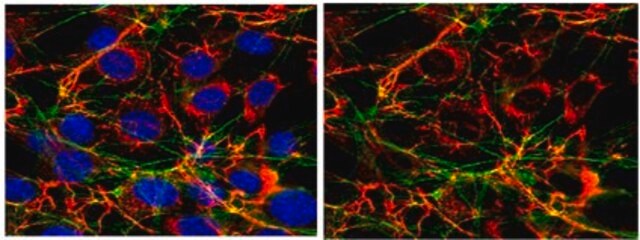MAB1940
Anti-Fibronectin Antibody
CHEMICON®, mouse monoclonal, DH1
Synonym(s):
Anti-CIG, Anti-ED-B, Anti-FINC, Anti-FN, Anti-FNZ, Anti-GFND, Anti-GFND2, Anti-LETS, Anti-MSF, Anti-SMDCF
About This Item
Recommended Products
product name
Anti-Fibronectin Antibody, cellular, clone DH1, clone DH1, Chemicon®, from mouse
biological source
mouse
Quality Level
antibody form
purified antibody
antibody product type
primary antibodies
clone
DH1, monoclonal
species reactivity
rat, guinea pig, human, rabbit
manufacturer/tradename
Chemicon®
technique(s)
immunohistochemistry: suitable
western blot: suitable
isotype
IgG1
UniProt accession no.
shipped in
wet ice
target post-translational modification
unmodified
Gene Information
human ... FN1(2335)
rabbit ... Fn1(100328589)
rat ... Fn1(25661)
Specificity
Immunogen
Application
Indirect immunohistochemistry at 1:200-1:400
A 1-hour fixation with 3-3.5% paraformaldehyde in 0.1 M phosphate buffer pH 7.4 is suggested. Shows some reactivity on paraffin sections depending on fixation conditions and time (Latvala et al., 1996).
Final working dilutions must be determined by end user.
Physical form
Legal Information
Not finding the right product?
Try our Product Selector Tool.
Storage Class Code
12 - Non Combustible Liquids
WGK
WGK 2
Flash Point(F)
Not applicable
Flash Point(C)
Not applicable
Certificates of Analysis (COA)
Search for Certificates of Analysis (COA) by entering the products Lot/Batch Number. Lot and Batch Numbers can be found on a product’s label following the words ‘Lot’ or ‘Batch’.
Already Own This Product?
Find documentation for the products that you have recently purchased in the Document Library.
Our team of scientists has experience in all areas of research including Life Science, Material Science, Chemical Synthesis, Chromatography, Analytical and many others.
Contact Technical Service






